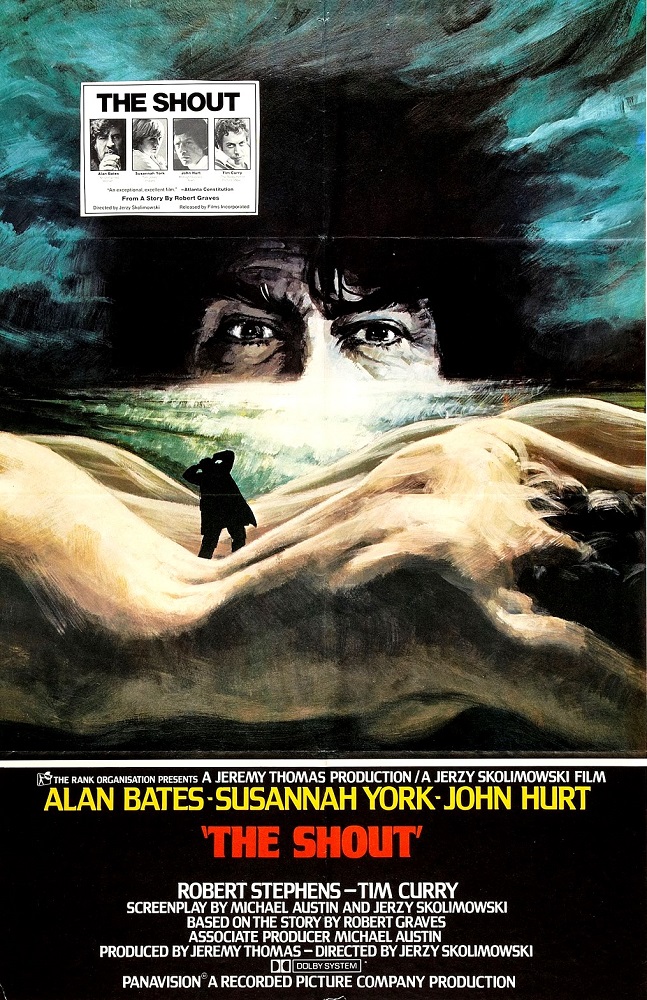
SHOUT, THE (director/writer: Jerzy Skolimowski; screenwriters: based on a short story by Robert Graves/Michael Austin; cinematographer: Mike Molloy; editor: Barrie Vince; music: Tony Banks & Mike Rutherford from Genesis; cast: Alan Bates (Charles Crossley), Susannah York (Rachel Fielding), John Hurt (Anthony Fielding), Robert Stephens (Medical Man), Tim Curry (Robert Graves), Julian Hough (Vicar), Carol Drinkwater (Wife), John Rees (Inspector), Jim Broadbent (Fielder in cowpat), Susan Wooldridge (Harriet), Nick Stringer (Cobbler); Runtime: 87; MPAA Rating: R; producer: Jeremy Thomas; MGM; 1978-UK)
“A gripping but elusive psychodrama based on a short story by Robert Graves.”
Reviewed by Dennis Schwartz
Polish director Jerzy Skolimowski (“The Adventures of Gerard”/”The Lightship”/”Barrier”) cowrites with Michael Austin a gripping but elusive psychodrama based on a short story by Robert Graves. It covers a cricket match, an asylum, the countryside of Devon, the powers of magic and a church service.
The quiet life of experimental electronic musical composer and part-time church organist Anthony Fielding (John Hurt), living in a desolate farmhouse in the serene North Devon countryside, changes radically when after playing the organ at a church service a bold, scornfully smart and articulate stranger, Charles Crossley (Alan Bates), chats him up about the church sermon and then invites himself to his cottage for lunch. During lunch the nervy tramp-like man tells Anthony and his attractive wife Rachel (Susannah York) of how he attained occult powers while living for 18 years among the Aborigines of Australia and shocks the childless couple by telling them he legally killed his children from his Aborigine wife while acting according to tribal custom when he returned to England.
The story is narrated by inmate Charles to local cricket player Robert Graves (Tim Curry), the writer of this story, when both are chosen by the mental asylum director (Robert Stephens) to be designated scorers for a cricket match between the locals and the inmates. Charles swears the story he’s telling is true, as the strange tale unfolds crossing the boundaries of truth and lies. By the end of the bizarre and unsettling tale, where Charles tells he learned from a native witch-doctor to kill by shouting, we are unsure whether the tale is merely a reflection of his madness or if he’s someone who has actually gained black magical mystical powers (there are a number of deaths that might be attributed to his shouts, and in one particular scene his shout in the dunes accidentally strikes down a shepherd and his entire flock of sheep).
The manipulative mad-hatter Charles takes advantage of the good-natured baffled couple and moves in with them, and immediately uses his occult powers to draw Rachel to him and away from her rational-minded husband. In trying to win back his wife, who has fallen under Charles’s spell, Anthony goes batty and is placed in the same mental asylum where Charles has been placed after being charged by the English police of being a child killer.
The opaque but excellently directed, acted (Bates makes for a wonderful looney) and conceived film sounds a disturbing note in its astounding irresistible nutty puzzling tale. Skolimowski is a first-class filmmaker, who is popular with the international film festival crowd. This film won the Grand Prize of the Jury at Cannes and was his biggest critical success in years.
REVIEWED ON 1/21/2010 GRADE: A-